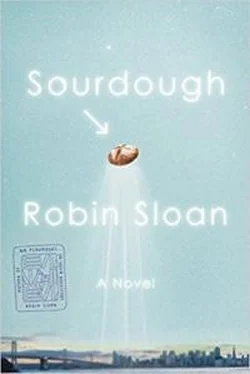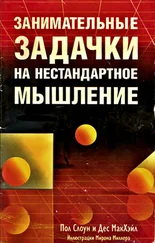Those flash cards were good.
Andrei looked down the concourse. “You quit … to work here?”
“This is where I solved the egg problem,” I told him. “I wouldn’t have been able to do it at the office. I bake bread now, and I’m going to put some things up for sale in the ArmOS marketplace.”
Andrei smiled at that, but still seemed perplexed. He and his companion said farewell and continued along the yellow-tape road. I told them to sample the Lembas cakes with an open mind.
Watching them walk away, it occurred to me again: Could Andrei be Mr. Marrow? They were both so deeply impatient with the world as it was …
Later, Charlotte Clingstone and her acolytes passed by on their way out. The acolytes looked exhausted; worn down by novelty. Clingstone spoke to them, and while they proceeded up onto the airfield, she returned to my workstation. I was afraid she was going to try again to recruit me, but she only thwapped a book down on the ping-pong table.
“From Portacio’s collection,” she said.
It was Candide .
“I read it when I was a little younger than you, and it was a formative experience. Thus, the name of the café.”
I inspected the book. It was very slender.
“I think you might enjoy it,” Clingstone said.
I wondered if this market was all silly gimmicks to her, or if she’d found anything at all that she actually liked.
“Yes. The mushroom grotto is interesting, isn’t it? We’re going to try those hen-of-the-woods.”
“Did you see the Lembas cakes?”
Charlotte Clingstone smiled and winced at the same time. “It’s a very impressive project, but I fear it’s a bit too far ahead of the curve for Café Candide. That woman still has things to prove. But one day? Who knows. Maybe we’ll start a dinner with her little cathedrals.”
HERE’S A STORY about how the starter came to us.
The first of the Mazg, before we were the Mazg, was a man named M., who was pressed into service as a slave. He rowed aboard a ship crossing the sea. (Which sea? The story does not specify, of course!) There was a storm; the ship capsized; and this man M. washed ashore onto a great rocky island that, even though it stood along many trade routes, was uninhabited because there was no place to grow anything, and so anyone who settled there would be dependent on others for their food, and that was a losing proposition in those times, on that sea.
M. cursed his luck. His refuge was barren. There were pools of condensation in the rock, and he sipped from these while little crabs snatched at his nose.
On the third day, starving, he considered his options, which were (1) attempt to swim elsewhere, or (2) throw himself off the great rocky island’s tallest outcropping. Two kinds of suicide.
Then he discovered a cave. Its opening was the narrowest crevice, invisible from any but the closest angle. He would not have discovered it if there had not been a smell emanating from inside—very faint, but in his starved state it drew him like a lure.
Lois, you know this smell.
I will write more later.
DEFLATION
AS THE MARROW FAIR ACCELERATED toward its launch, a crisis unfolded, first slow, then fast.
To ensure I could make enough loaves to sell five or six days a week, I was testing myself, with the Vitruvian slinging dough double time and the Faustofen’s burners roaring nonstop. I ordered the fancy flour in bags larger than I’d known existed. To match all that flour, to mix dough in the volume I required: I needed more starter.
It felt like a kind of surrender, but I transferred the Clement Street starter from its ceramic crock into a wide plastic tub. When I began to bake, I prepared a prodigious amount of floury paste for fuel. But in its new tub, the Clement Street starter grew slowly, almost reluctantly. I put the music of the Mazg on repeat and turned up the volume; it didn’t have any effect.
Worse: the loaves that resulted were deflated. Upon reflection, it had been happening for some time, just too gradually to notice. Now there was no denying it: the loaves were not as round as before, and when I tapped them on their backs, I heard unappetizing thuds. Inside, the crumb was different: heavy and dense. The smell was off, too: less banana, more acetone. And the faces that peered up from the crust were flat masks of resignation.
I was asking a lot of the starter, I realized. But I was treating it well; I was offering it a daily feast of the finest wheat sugars! This was a partnership, a symbiotic relationship, and the starter had a job to do. The Vitruvian and I were doing ours.
I tried to negotiate with it. “What’s the matter? What do you need?”
No gurgles. No puffs. No phenomena at all. The Clement Street starter seemed … depressed.
Each day, the starter took twice as long to double in volume. I was accustomed to the mathematics of exponentiation working in my favor; now I worried that it had turned against me. If this trend continued, there wouldn’t be enough hours in the day to get what I needed for the day’s loaves. The Marrow Fair’s opening was approaching.
I began to quietly freak out.
It was possible I was overthinking it. The problem might be mundane. A search of Global Gluten revealed that, yes, starters sometimes lost their mojo. The customary recommendation was to throw it out and start over, but I couldn’t do that. I wanted to bang on the keyboard: WHAT IF YOUR STARTER WAS GIVEN TO YOU BY MYSTERIOUS SIBLINGS FROM AN UNKNOWN COUNTRY AND WHAT IF IT’S IRREPLACEABLE??
Naz at the coffee bar noticed my mood. “This might be more than a cappuccino can fix,” he said. I ordered one anyway, and while he was preparing it, I explained that my sourdough starter was exhibiting a pathology I couldn’t diagnose.
Naz nodded sagely. “This thing”—he clonked his espresso machine on the head—“is fantastic, but it’s totally temperamental. I always struggle with it. You know who turned out to be the Marzocco whisperer? Anita, with the crickets. She rebuilds old motorcycles.” He clacked a cup down into its saucer and slid it across the countertop. “This place is a magnet for weirdo geniuses. Somebody at the Marrow Fair can help you. Just put a note in the newsletter.”
I composed my query, stared at it on my laptop’s screen for ten minutes, then sent it to Horace for inclusion in the next day’s dispatch.
In the morning, Jaina Mitra found me at my workstation. I was sitting in the folding chair, waiting for a batch of dough to very slowly rise.
For once, her hair was down. It was impossibly thick—definitively a different substance than what was attached to my scalp. She was wearing a T-shirt, not her usual lab coat, and she seemed more relaxed than I’d ever seen her before. Maybe things were going well with Lembas.
“I saw your note in the newsletter,” Jaina Mitra said lightly, “and … I have an idea. I could run your starter through the sequencer. Find out what’s in there.”
I got the sense she was just looking for reasons to use her amazing machine. I thought about the sequencing process as she had described it—the pulverization of the cells, the divination of their entrails. What good would it do me to know about the starter’s dead DNA? It was its living behavior I needed to understand.
“I’ll think about it,” I said. “It’s nice of you to offer. Thanks.”
“Of course. Tell me what you decide. And you should come over and try the new batch sometime. It’s better! I think it’s better. I’m almost there.”
Nothing was happening at my workstation. The dough was going to take a very, very, very long time.
I rose from the folding chair. “Can I try it now?”
Over at Jaina Mitra’s lab, I bit into one of the new Lembas cakes. The gluiness had improved, but there was a new flavor—deeply metallic. It tasted uncomfortably like blood. I winced, and I could see the disappointment in her eyes. She took a bite herself, and cursed. “Something changed. It wasn’t like this last night…”
Читать дальше










